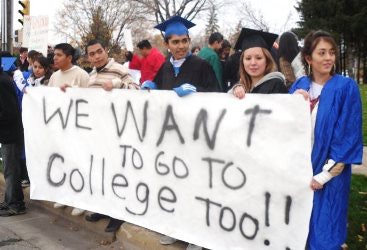
The bill was first brought to a senate subcommittee on border security Monday and was passed Tuesday to the Veterans Affairs and Military Installations Committee. According to the Texas Tribune, Campbell said at the Monday hearing that the rationale behind repealing the law was to ensure that state resources go to legal residents first. According to the Quorum Report, an online newsletter that covers Texas politics, she also said that 735 students benefited from in-state tuition in 2002, a number that increased to 25,000 by 2013.
According to a report from the Center for Public Policy Priorities, an Austin-based think tank, 24,770 non-citizen resident students paid in-state tuition under House Bill 1403 in 2013, or 1.9 percent of all students statewide. The report noted that those students also paid $51.6 million in tuition and fees in 2013.
“There is not any fact-based evidence to support [the bill],” said Ann Beeson, executive director of CPPP. “(Senator Campbell) is asserting that there is a cost to tax payers that derives from the existence of this program and these particular students. … That is a complete misunderstanding of the way funding for higher education works.”
CPPP submitted testimony and opposition to the bill. Beeson said that, since HB 1403 was signed, the state has spent less on higher education, meaning that students are picking up more of the tab in their tuitions.
Some opposed to HB 1403 have argued that permitting undocumented students to attend public institutions at in-state tuition takes away seats from legal citizens. Beeson said that this was also a misconception—the schools that undocumented students are most likely to attend need more students. “Seventy-five percent of these (undocumented) students are in community colleges, and community colleges in Texas are looking for more students. They want these students,” she said.
Texas was the first state in the union to implement an in-state tuition policy for undocumented students by passing the Texas DREAM Act, or HB 1403, in 2001. Since then 19 states have followed suit, according to the University of Houston Law Center’s Institute for Higher Education Law and Governance.















